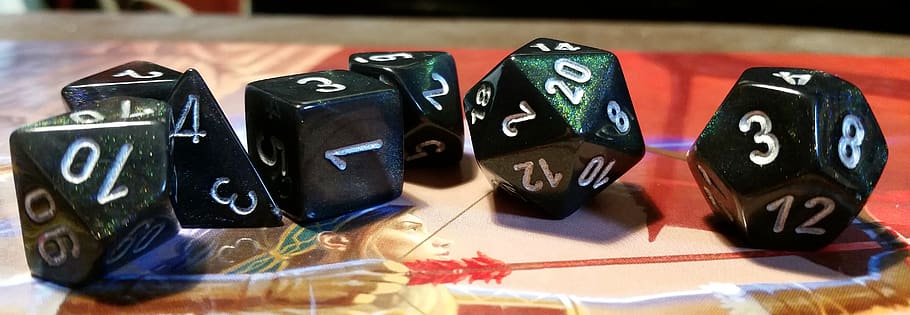Etiquette and Advice: TTRPG Week 4
This, week we'll go over some etiquette and advice. I don't think I need to go into basic etiquette, it's just common sense - don't do anything you wouldn't do at a friend’s house and don't be a jerk (or “That Guy” as the community says). I'll be giving you a few bits of etiquette specific to gaming and some of the more important advice.
Etiquette:
Rule Disputes - Inevitably it will happen that a rule is either forgotten, or perhaps the wording is vague - regardless, play has come to a halt while the ruling is resolved. If the rule in question specifically pertains to your character or is one that will come up often, have it open in a new tab, or bookmarked in the PDF or actual rule book. This will save a lot of time for everyone. However, as can be the case with vague wording, it will require additional research. In this case, the GM will likely make a judgment call to get the game flowing again. When this happens, whether it went your way or not, put aside any objections, or comments, etc. and when the session ends, politely bring them up with the GM. The key here is to disrupt the game as little as possible, and most GMs will be more than willing to revisit and correct a ruling when they have time to do so.Social Disruptions - One of the best things about gaming is the friendships you will build at the table. But it can be an issue at times, namely that chatting and joking around can distract from and disrupt the game. Save the non-game related chat for before and after the session, as well as break periods. While it's inevitable that jokes will fly, try to reign it in a bit. Likewise, you should not be browsing the internet, or social media, or chatting on the phone, etc. If you are expecting an important communication, let the GM know before the session starts and it shouldn't be a problem.
Scheduling Problems - Thanks to sites like Roll20 and Fantasy Battlegrounds, you can get into a game at pretty much anytime from anywhere. Even so, sometimes you just will not be able to make it to a game. The only thing you need to do is make sure you let the GM know as soon as possible. This will allow the GM to either alert the other players to the cancellation, or adjust the game to the smaller group.
Advice:
Lawful Stupid, Chaotic Stupid - Morality is a complex and difficult thing to condense down into the mechanics of a game, so it's no surprise D&D kind of flubbed it. In earlier editions, not only was the alignment system a way to help players determine how a character should act in a given situation, but it had mechanical consequences. Certain items and spells could only be used by people of a specific alignment, and a number of classes had a restriction on alignment and would lose their powers if it changed. This, combined with more than a little misinterpretation of intent and some letter-of-the-law over spirit-of-the-law logic, ended up with more than a few Paladins charging the enemy army head on screaming challenges at the top of their lungs, and Chaotic Neutral characters acting completely randomly until either the party or GM got sick of it. My advice is to take a look at good examples of the archetype, such as Ned Stark and 80s Robocop for Lawful Good; or Joffry and Heath Ledger's version of the Joker for Chaotic Evil.Problems at the Table: The Players - At some point you and another player may have an issue. And we're not talking someone is having a bad day, we're talking repeated and or consistent bad behavior. Now, if you feel comfortable doing so, talk to the individual first. Perhaps take them aside during a break and calmly and politely discuss the situation. If that doesn't work, or if you didn't feel comfortable talking to the individual first, then talk to the GM. Again, pull them aside before or after the session or during a break, and calmly and politely explain the situation. The GM will typically handle the situation from there. If the problem player doesn't get their act together they will likely be asked to leave. However, if nothing at all happens, I would strongly recommend excusing yourself from the group.
Problems at the Table: The GM - This one tends to be a larger issue than dealing with a problem player. If the GM is acting badly, you probably want to excuse yourself and move on to another group. However, if you feel comfortable doing so, pull the GM aside and calmly and politely talk to them about the situation. They may ask you to leave, or worse, promise to change but do nothing of the sort - in which case leave the group. I should state that this and the previous situations are very rare, and the one time I had a problem player, talking did work
Step Outside Your Comfort Zone - One of the things that is lost in the glitz of the adventurer lifestyle is that you can choose to be something you are not. If you want you can play as another race, or gender, or with another creed. The only thing limiting you is how far you want to go.
And lastly, Creativity is Your Friend - It can be very difficult to balance encounters for the group, and you may find yourself stymied by a hazard or combat. At times like this, think outside the box. Perhaps you can make use of the environment, or find an alternative use for one of the numerous equipment items. Try new things, GMs tend to reward creativity.
- by Jason., Twin Rivers Branch

Comments
Post a Comment